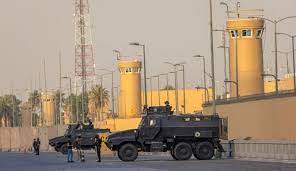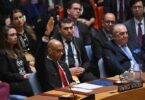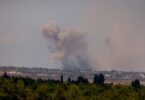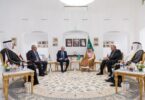Dalia Al-Aqidi
In light of the ongoing conflict between Israel and Hamas, a series of concerning developments have emerged in Iraq, where Iran-backed militias have launched numerous attacks against the US Embassy in Baghdad and other American facilities accommodating troops.
Beyond the realm of diplomatic representation, the US maintains a presence of about 2,500 troops in Iraq, with its mission being to offer guidance and support to local forces engaged in the ongoing struggle against Daesh.
The US State Department last week strongly condemned the recent rocket attacks, expressing deep concern over the threat these Iran-aligned militias pose to Iraq’s security and stability. Iraqi Prime Minister Mohammed Shia Al-Sudani also denounced the targeting of embassies as an intolerable act, emphasizing the imperative of bringing those responsible to justice. He expressed deep concern over the salvoes of rockets that were launched at the US Embassy and called on the nation’s security forces to exert their utmost efforts in tracking down the perpetrators of this grave offense.
In an ironic move characteristic of successive Iraqi administrations, Al-Sudani initiated a multifaceted response to the situation. Firstly, he ordered a comprehensive investigation into the militias responsible for these attacks. This investigative measure supposedly seeks to identify the individuals and groups involved in orchestrating and executing the rocket attacks and ultimately ensuring that those responsible are held accountable for their actions. Furthermore, the prime minister undertook an organizational change by replacing the security regiment within Baghdad’s highly fortified Green Zone. This decision aimed to bolster security measures within this crucial district, which houses diplomatic missions and critical government infrastructure.
The pronouncements and actions undertaken by the Iraqi leader may appear commendable on the surface, as he seeks to project an image of being in command of the security landscape within his nation and to demonstrate his commitment to holding pro-Iran militias accountable for their transgressions against both foreign and domestic interests. However, a closer examination of these measures raises pertinent questions regarding their efficacy and underlying motivations. The initiation of an investigation, ostensibly aimed at identifying and apprehending those responsible for the attacks, prompts contemplation regarding its significance. It is disconcerting to consider whether such investigative endeavors will yield meaningful outcomes, especially in light of reports that the Iraqi leader already knows the identity of the culprits.
This apparent contradiction raises concerns regarding the efficacy and sincerity of such investigations, as it leads one to question whether they serve primarily as symbolic gestures rather than substantive actions aimed at genuine accountability. Ironically, the leaders of prominent Iraqi factions, such as the head of the Kata’ib Sayyid Al-Shuhada militia, have publicly rejected any notion of ceasing or reducing their operations. Their steadfast commitment to ongoing hostilities is explicitly linked to external events, notably the war in Gaza. These declarations underscore the situation’s complexities and the deeply entrenched motivations that fuel these militias’ actions, rendering it increasingly challenging for investigations alone to effectively address the underlying issues.
Additionally, senior officials within Kata’ib Hezbollah, another influential militia group, have unabashedly vowed to persist in targeting US assets within Iraq. This unyielding stance not only defies the Iraqi leader’s directives but also underscores the persistence of grievances that continue to fuel hostilities. Perhaps most concerning is the overt challenge issued by these militias to the Iraqi leadership itself. They contend that members of Iraq’s security forces who cooperate with US forces are “accomplices in its crimes.” This audacious assertion not only undermines the Iraqi government’s authority but also serves to exacerbate internal divisions, complicating any prospects for reconciliation or resolution.
A cursory review of Iraqi television broadcasts provides unmistakable evidence that the leaders of pro-Iran militias exhibit a blatant disregard for the authority vested in the prime minister and the rule of law within Iraq. This troubling disregard for established governance structures raises concerns about the potential for these militias to wield considerable influence, to the extent that they could potentially undermine the office of Al-Sudani should Iran choose to exert such leverage. The pro-Iran militia leaders’ actions and rhetoric convey a message that they operate outside of the confines of the law and operate with impunity, challenging the very foundations of democratic governance and the rule of law that Iraq aspires to uphold. The possibility that Tehran might choose to utilize these militias as instruments of its foreign policy or exert pressure on the Iraqi government through them is a profoundly troubling scenario. It raises pressing questions about Iraq’s sovereignty and its ability to exercise independent decision-making in the face of external pressures. It also underscores the volatile and precarious nature of the political and security landscape in Iraq, where nonstate actors backed by external powers hold the potential to disrupt and challenge the nation’s stability and governance.
Undeniably, the Iranian regime seeks to damage the bilateral relations between Baghdad and Washington. If successful, this would have dire consequences for Iraq, profoundly impacting the country’s political, economic and security dynamics. The US severing ties with Iraq could lead to heightened political instability in the country, potentially exacerbating internal conflicts and violence as various factions vie for power. Iraq has a fragile political landscape with multiple ethnic and sectarian divisions. US involvement has played a role in maintaining a semblance of stability, with it mediating between different factions. Cutting ties between the two countries could increase political instability, potentially exacerbating internal conflicts and even leading to violence.
The US has also been assisting Iraq in its fight against various extremist groups, including Daesh. A complete disengagement could weaken Iraq’s ability to combat these threats effectively. This could potentially allow extremist groups to regroup and regain strength, posing a danger not only to Iraq but to regional and global security. Meanwhile, Iraq’s economy is closely tied to the US through trade, investment and oil exports. The disruption of this financial relationship could lead to economic hardship in Iraq.
The consequences have a humanitarian angle as well. Washington has been providing humanitarian aid and assistance to the central government, including support for displaced populations and reconstruction efforts. Stopping these programs would impact these efforts and potentially worsen the already dire humanitarian situation in some parts of Iraq. It is imperative for Al-Sudani and other Iraqi political leaders to remain acutely aware of Iran’s ambitions and exercise prudence to prevent any deterioration in relations with Washington. Failure to do so could have dire consequences, with the ultimate losers being the Iraqi people. It is in the best interest of Iraq to maintain balanced and constructive international relationships for the prosperity and stability of the nation.







